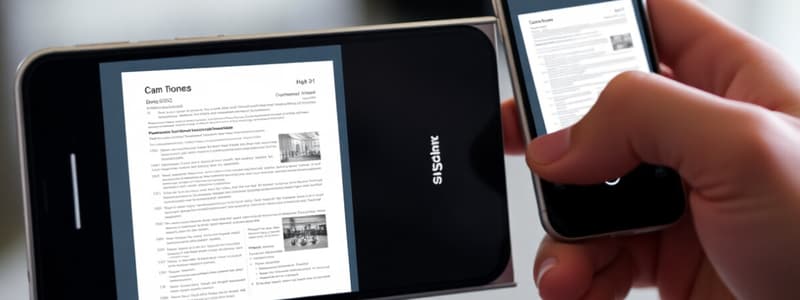Podcast
Questions and Answers
What is the main function of CamScanner?
What is the main function of CamScanner?
- Editing videos
- Managing emails
- Scanning documents (correct)
- Creating spreadsheets
Which feature is NOT commonly associated with CamScanner?
Which feature is NOT commonly associated with CamScanner?
- Cloud storage integration
- Optical character recognition
- Photo editing (correct)
- Document sharing
What format can documents be saved in using CamScanner?
What format can documents be saved in using CamScanner?
- PPTX
- PDF (correct)
- AVI
- DOCX
Which of the following best describes the purpose of optical character recognition (OCR) in CamScanner?
Which of the following best describes the purpose of optical character recognition (OCR) in CamScanner?
What advantage does CamScanner provide when scanning documents?
What advantage does CamScanner provide when scanning documents?
Which feature enhances user experience in organizing scanned documents within CamScanner?
Which feature enhances user experience in organizing scanned documents within CamScanner?
What is a common privacy concern associated with using apps like CamScanner?
What is a common privacy concern associated with using apps like CamScanner?
What is the main function of the application mentioned?
What is the main function of the application mentioned?
For which purpose is CamScanner particularly valuable for students?
For which purpose is CamScanner particularly valuable for students?
Which feature is likely to be included in document scanning applications?
Which feature is likely to be included in document scanning applications?
What might be a limitation of using a mobile document scanning application?
What might be a limitation of using a mobile document scanning application?
Which attribute is crucial for ensuring effective document scanning?
Which attribute is crucial for ensuring effective document scanning?
What kind of images does a document scanning application primarily process?
What kind of images does a document scanning application primarily process?
What is an expected outcome when using a document scanning application?
What is an expected outcome when using a document scanning application?
Which user benefit is a key selling point for scanning apps?
Which user benefit is a key selling point for scanning apps?
Which of the following features is typically associated with CamScanner?
Which of the following features is typically associated with CamScanner?
Which of the following is NOT typically a feature of document scanning applications?
Which of the following is NOT typically a feature of document scanning applications?
What type of documents can CamScanner scan?
What type of documents can CamScanner scan?
Which platform is CamScanner primarily available on?
Which platform is CamScanner primarily available on?
What format does CamScanner typically save scanned documents in?
What format does CamScanner typically save scanned documents in?
How does CamScanner enhance the quality of a scanned document?
How does CamScanner enhance the quality of a scanned document?
Can CamScanner be used for collaborative purposes?
Can CamScanner be used for collaborative purposes?
What is a common issue users face with CamScanner?
What is a common issue users face with CamScanner?
Flashcards
What is CamScanner?
What is CamScanner?
A mobile application designed to scan documents and convert them into digital formats like PDF or JPG.
Scanning a document with CamScanner
Scanning a document with CamScanner
Taking a photo of a document using a smartphone or tablet camera.
Converting scanned documents to PDF with CamScanner
Converting scanned documents to PDF with CamScanner
Converting a scanned image into a searchable and editable PDF file.
Image editing in CamScanner
Image editing in CamScanner
Signup and view all the flashcards
Document storage in CamScanner
Document storage in CamScanner
Signup and view all the flashcards
Sharing documents using CamScanner
Sharing documents using CamScanner
Signup and view all the flashcards
Electronic signing in CamScanner
Electronic signing in CamScanner
Signup and view all the flashcards
Merging documents in CamScanner
Merging documents in CamScanner
Signup and view all the flashcards
CamScanner
CamScanner
Signup and view all the flashcards
Mobile Scanning
Mobile Scanning
Signup and view all the flashcards
Optical Character Recognition (OCR)
Optical Character Recognition (OCR)
Signup and view all the flashcards
Document Management Features
Document Management Features
Signup and view all the flashcards
Multiple Export Formats
Multiple Export Formats
Signup and view all the flashcards
Cloud Storage Integration
Cloud Storage Integration
Signup and view all the flashcards
Data Redaction
Data Redaction
Signup and view all the flashcards
CamScanner
CamScanner
Signup and view all the flashcards
How does CamScanner work?
How does CamScanner work?
Signup and view all the flashcards
What is PDF?
What is PDF?
Signup and view all the flashcards
What is JPG?
What is JPG?
Signup and view all the flashcards
What is image editing in CamScanner?
What is image editing in CamScanner?
Signup and view all the flashcards
How does document storage work in CamScanner?
How does document storage work in CamScanner?
Signup and view all the flashcards
What is document sharing in CamScanner?
What is document sharing in CamScanner?
Signup and view all the flashcards
What is electronic signing in CamScanner?
What is electronic signing in CamScanner?
Signup and view all the flashcards
Study Notes
Computer Peripheral Devices
- CPU is not a peripheral device
- Keyboard, monitor, and mouse are peripheral devices
System Unit Components
- A port is a place that allows data transfer between various devices and a computer.
Memory Types
- ROM (Read-Only Memory): User cannot write new information or instructions to this memory.
- CPU can operate on data from secondary storage after it is loaded into RAM.
Data Units
- A byte is a group of 8 bits.
- A megabyte equals 1,000,000 bytes.
Input/Output Devices
- Device drivers allow input/output devices to communicate with the computer system.
Computer Memory
- The two basic types of computer memory are primary and secondary.
Optical Storage Devices
- A CD is a nonerasable disk used for storing digitized audio information.
Output Unit Function
- The output unit converts user input into a computer-understandable format.
System Component
- A scanner is a device used to give digitized form of printed papers.
Computer Monitors
- CRT monitors are similar to televisions and are used with nonportable computers.
- LCD, flat panel, and LED monitors are lightweight and used in portable and non-portable computer systems.
Input Unit Function
- It reads instructions and data from outside the computer world.
- It does not convert the data into a usable format for human understanding.
- It does not include converting or formatting data for human understanding.
Data
- Data is the raw material used as input for processing. This creates information.
Computer Characteristics
- Speed, accuracy, and capacity are characteristics of computers, not IQ.
Memory
- Memory is an electronic holding place for data retrieval later.
Memory Size
- The size of main memory depends on the size of the address bus.
Memory Types (Independent of Address Bus)
- Secondary memory
MAR
- MAR stands for Memory Address Register.
Optical Disks
- Optical disks are a promising random access medium for high-capacity secondary storage.
Optical Disk Technology
- Optical disks use laser beam technology.
Optical Disk Storage Capacity
- The capacity of an optical disk is calculated by multiplying the number of sectors by the number of bytes per sector.
Disk Rotation
- Disk rotation must vary inversely with the radius of the disk.
Disk Sectors
- Disk sectors maintain a constant size.
Optical Disk Access Time
- The access time for optical disks typically ranges from 100 to 300 milliseconds.
Laser Beam Technology
- Laser beam technology is used in optical disks.
RAID
- RAID (Redundant array of independent disks) is a method to combine multiple disk packs for a storage unit function.
Updating In Place
- The process of updating a disk record to its original location.
Scrolling
- Moving a page up or down on a computer screen.
Harmful Programs
- A virus is a harmful program.
Recently Used Data/Programs
- Recently used data is swapped into memory.
Storage Unit
- The storage units hold data and instructions to be made readily available.
Vertical Market Software
- Software written specifically for a given business type.
Software Piracy
- Making illegal copies of copyrighted software.
Desktop Publishing Software
- Software used to create professional newsletters and reports.
Database Management Software
- Software used to store, update, manipulate, and retrieve data.
Commercial Software
- Packaged software
Office Suites
- Antivirus software is not typically included in office suites.
Emulation
- Software that makes a personal computer function like a terminal.
Browser
- Software on a user's computer that provides a graphical user interface for accessing the Internet.
Web Site
- A website is a location on the World Wide Web.
Protocol
- TCP/IP is the protocol used to facilitate communication on the internet
Thin Client
- This is a stripped-down computer that accesses network resources.
Earth Stations
- Devices used to communicate with satellites
Transponder
- Devices used in satellite transmission
Digital Medium
- A cellular phone is the least susceptible medium to noise.
Token Passing
- A method used by Token Ring networks to control network access.
Client/Server Relationship
- Processing done by a server and access by a client.
Distortion
- Distortion in a signal is called noise.
Data Representation
- Data is represented by the binary system (0s and 1s).
Computer Memory Unit
- The term "memory" is often used in place of primary storage, used for the rapid retrieval of data.
CPU Components
- A CPU has two parts: The Control Unit and the ALU (Arithmetic Logic Unit).
Machine Cycle
- A machine cycle is the time necessary to take the steps to fetch, decode, execute, and store an operation.
Computer Software
- Software is step-by-step instructions to run the computer.
Computer Types
- Microcomputers are desktops and personal computers.
Computer Data
- Information is processed data.
Computer Units
- Printers and screens are output units.
CPU Functions
- The CPU does calculations, moving and processing data. It executes instructions and interacts with memory and other computer components.
Computer Coding
- ASCII is the most widely used coding scheme.
Computer Memory
- RAM stores data to be accessed quickly for processing.
Computer Memory
- RAM is a volatile memory- loses data when power is off.
Computer Storage
- Secondary storage devices are long-term, and data remains stored when power is off.
- The secondary storage holds data that is not immediately needed for processing.
Computer Components
- CPU contains the Control Unit and the ALU, which perform the calculations.
Studying That Suits You
Use AI to generate personalized quizzes and flashcards to suit your learning preferences.




